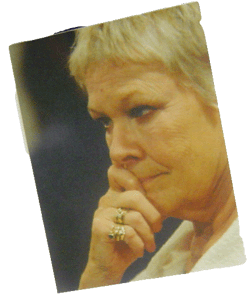
5th December 2003

THERE IS NOTHING LIKE A DAME
All's Well That Ends Well at the RSC?
Dame Judi Dench’s return to
the banks of the Avon has been much trumpeted, a reappearance in the town
whose stages she first graced in 1961. Yet, thankfully, in Greg Doran’s
production of little-performed All’s Well, she doesn’t so much steal the
show as steel it.
For a concern must have been
that people would turn up to see Dame Judi, rather than the play itself. The
part of the Countess of Rossillion, widowed mother of Bertram and charged with
the care of gentlewoman Helena after the death of her father, a physician,
though could not be more perfectly crafted for Dench. That the audience is
aware of her very presence and experience on the stage is advantageous in a
character that helps her young charges navigate the choppy waters of love and
loss. The Countess has been there before – just like the celebrity playing
her – and Dench’s not overstated, nostalgic matriarch, at turns poignant
and fleetingly wry, provides a wonderful strength and backbone for the younger
performances. Helena (Claudie Blakley) stands out – she oozes capability and
determination, with Blakley’s very demeanour, the stridingly purposeful way
she covers the stage, suggestive of the practicality that Helena employs to
get her man. Yet, in her ardent moments this practicality can be seen to be a
mask for the naïve and uncertain girl beneath. Blakley’s slightly
shrinking, frightened portrayal of someone who feels the need to do something,
anything, to alleviate her pain, conveys this very well.
Jamie Glover discharges his
Bertram with the requisite level of arrogance, but is overshadowed in
performance by the distinctive Guy Henry as his gangly sidekick Parolles. He
shambles around the stage – a little bit like the bird from the Kia-Ora
advert – and his lanky vulnerability and girly hair is a great antidote to,
and perhaps satire upon, the warlike masculinity of his peers. When skiving
off duty as a mercenary in the Tuscan Wars, he wees on a cart, it seems for
the sake of it (and the angle was all wrong). Doran need not have stooped to
this for comedy, for Henry is hilarious when making his trumped up claims and
when being exposed for a coward by his peers.
If Dench is the Queen of
British theatre, Gary Waldhorn makes a brilliant king. He plays the two
distinct characters of the King of France – the sickly, despairing invalid
who becomes once more a regal monarch resplendent with authority – with
aplomb, almost reprising his disdaining Vicar of Dibley role when cutting
through the confusion and getting to the point when ends are tied up at the
denouement. All of this takes place against a set inspired by old daguerrotype
images of frosty countryside, aptly representing “a country house closing up
for a long, cold winter”. It sounds a fine idea, yet, with chunky metal
framing proceedings, a little incongruously I thought, looks more like some
sort of relic of heavy industry.
This is indeed an industrious production, that works hard to bare the soul of a not often performed play. It contains much in the way of great performance and is solid, if not spectacular. And does it End Well? The lights fade on Bertram and Helena, together at last, but, as they look into each other’s eyes, one gets the impression that they are not altogether certain about their future. Doran encapsulates the essence of why the play is difficult in that perfectly poised final image. Dame Judi finishes up in a frock of leafy reds and oranges – in the autumn of her career perhaps, but one would hope with many more Stratford performances to come that we need not wait another twenty-four years to see.
Links:
Royal Shakespeare Company - www.rsc.org.uk
© Ben James 2003

